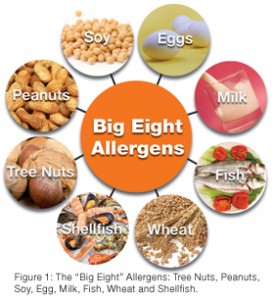 Neither one is fun, but there are some key differences between food allergies and digestive problems. One example: With a food allergy, you might get hives but you probably won’t with a digestive condition. Find out how to determine which is behind your symptoms.
Neither one is fun, but there are some key differences between food allergies and digestive problems. One example: With a food allergy, you might get hives but you probably won’t with a digestive condition. Find out how to determine which is behind your symptoms.
When Loring Gotschall of Marblehead, Mass., eats avocados, bananas, raw chestnuts, or kiwi, she has an unusual reaction — severe abdominal pain for a couple of hours.
“I used to eat a banana every day for breakfast, and over time they started affecting me,” she says. At first, she thought a digestive problem was causing the cramps, but she soon discovered that it might be a food allergy related to her known allergy to latex, found in some medical gloves and bandages. Certain foods, including avocado, banana, chestnut, kiwi, and pineapple, contain some of the same proteins as latex, which is made from natural rubber.
Is It a Food Allergy or a Digestive Problem?
It turns out that Gotschall probably has a food allergy, but determining whether a reaction is a food allergy or digestive issue can be difficult. Food allergies and digestive problems, known as food intolerances, can have similar symptoms. With both conditions, eating certain foods can result in abdominal symptoms, including diarrhea, abdominal pain, and gas.
But with most food allergies, certain symptoms can help distinguish them from a non-allergic digestive problem. “Food allergies, in most cases, are going to be associated with an acute onset of hives and/or lip or tongue swelling that is going to happen within 10 to 15 minutes of digesting the food, if not immediately,” says Julie McNairn, MD, an allergist and immunologist in Cincinnati. This is not an uncommon problem: More than 3 percent of adults have one or more food allergies, according to a study in the Journal of Allergy and Clinical Immunology.
If you often feel sick after consuming certain foods, it is possible that you could have a food allergy. Common symptoms include:
- Hives (itchy, raised, areas of redness on the skin)
- Eczema (red, sometimes scaly patches that may itch)
- Asthma
- Vomiting
- Diarrhea
- Abdominal cramping and/or pain
- Skin rash around the mouth
- Itching of the mouth and throat
- Swelling of the mouth or throat, or difficulty swallowing
- Gas
- But if you experience mainly abdominal symptoms after eating a certain food, such as milk, you may simply have a food intolerance, which means that your body cannot properly digest that particular food. That means your body cannot properly digest that food.
“If you eat a food and it just causes your stomach to be upset, that is probably just an intolerance,” says Dr. McNairn. dinner parties with friends. The sooner you know what the problem is, you can begin correcting it, and get both your diet and your social life back into gear.
Diagnosing a Food Allergy
If you notice a reaction when you eat certain types of foods, talk to your primary care physician. If he suspects a food allergy, you may be referred to an allergist who can determine whether you are allergic to certain food allergens or if you have an intolerance. Either way, your doctors can help come up with a plan to avoid the food and manage the symptoms when and if a reaction occurs.
You should do this sooner than later. Fear of having a reaction to foods can keep you from enjoying dinners out in restaurants or
By Krisha McCoy Medically Reviewed by Lindsey Marcellin, MD, MPH
From EverydayHealth.com